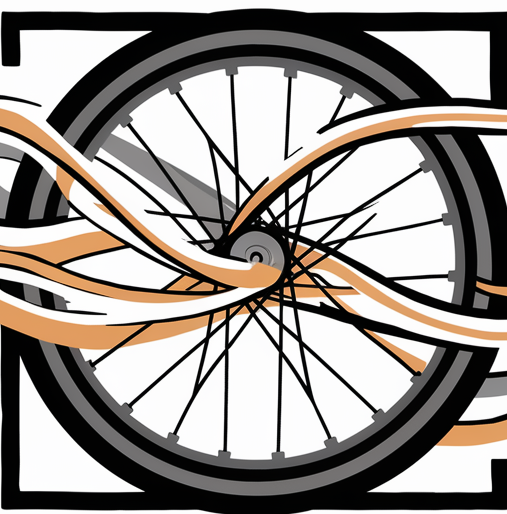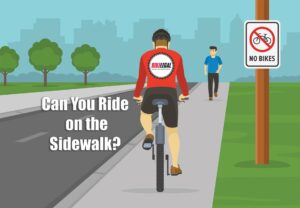Yes, you can get a DUI on a bicycle. Riding a bike under the influence is illegal in many places.
Cycling is a great way to get around. It’s eco-friendly and keeps you active. But, just like driving, biking comes with responsibilities. Many people think riding a bike while drunk is harmless. This is not true. Law enforcement can and will stop you if you’re intoxicated.
DUI laws often apply to all vehicles, including bicycles. The risks are real. You can harm yourself or others. Stay safe and understand the laws. This blog will explore the dangers and consequences of biking under the influence. Keep reading to learn more.

Credit: www.youtube.com
Oui Laws And Bicycles
Exploring bicycle laws reveals surprising facts. Riding a bicycle while impaired can lead to an OUI charge. Bicycles are subject to similar laws as motor vehicles in many places.
Navigating the world of Oui laws can be tricky, especially when bicycles come into play. You might wonder if these laws apply to cyclists just as they do to motorists. Let’s dive into the specifics and see how the law views bicyclists in the context of Oui offenses.Legal Definitions
First, it’s crucial to understand what Oui stands for. Oui means “Operating Under the Influence,” and it typically refers to driving a motor vehicle while impaired by alcohol or drugs. The law defines this act as a crime because it poses significant risks to public safety. But here’s where it gets interesting. A bicycle isn’t exactly a motor vehicle, right? However, legal definitions can vary by jurisdiction. In some areas, bicycles are considered vehicles, which means Oui laws might still apply. Check your local laws to see how they define a vehicle.Applicability To Cyclists
So, does this mean you could face an Oui charge while riding a bike? In many places, the answer is yes. Even though bicycles aren’t motorized, they are often subject to the same traffic laws as cars. Imagine this scenario: you’re cycling home after a night out with friends. You might think you’re avoiding legal trouble by not driving a car. But if your state or country treats bicycles like vehicles, you could still get in trouble for riding under the influence. Consider this as a wake-up call. Always know the local laws before hopping on your bike after drinking. It’s not just about legality; it’s about safety. Would you really want to risk your life or the lives of others for a short ride home? Take a moment to think about how this applies to your daily life. Next time you’re planning a night out, think ahead. Maybe leave the bike at home and opt for a safer alternative.State-specific Regulations
Different states have specific rules about operating a bicycle under the influence. In some areas, it’s illegal and can result in penalties. Always check local laws to avoid surprises.
When it comes to riding a bicycle, you might think you’re free from the rules that apply to motor vehicles. But can you actually get an OUI (Operating Under the Influence) while cycling? The answer isn’t as straightforward as you might think. Regulations vary significantly from state to state, meaning what applies in one place might not apply in another. This creates a complex web of rules that can be difficult to navigate, especially if you frequently travel across state lines with your bicycle. Understanding these state-specific regulations is crucial for cyclists who want to stay on the right side of the law.Variations Across States
The laws governing cycling under the influence vary across the United States. In some states, bicycles are considered vehicles, and riding under the influence is treated similarly to driving a car while intoxicated. For example, in California, cyclists can be charged with a CUI (Cycling Under the Influence). Meanwhile, in other states like South Dakota, the law doesn’t explicitly cover bicycles, leaving a legal gray area. This patchwork of laws means you need to be aware of local regulations wherever you plan to ride. Have you checked the cycling laws in your state recently?Case Studies And Examples
Let’s look at how these laws play out in real life. In Oregon, a cyclist was charged with a DUI after being caught riding with a blood alcohol level over the legal limit. The state treats cyclists the same as drivers when it comes to DUIs. Contrast this with Florida, where a cyclist was stopped for erratic riding but was not charged with a DUI. In Florida, bicycles are not classified as vehicles under DUI laws. These examples highlight the importance of understanding your state’s specific regulations. Have you ever encountered a scenario where local laws surprised you? By staying informed, you can enjoy your ride without the worry of unexpected legal trouble.Consequences Of Oui On A Bicycle
Riding a bicycle under the influence is not without consequences. Many assume that cycling is exempt from strict DUI rules. This assumption is wrong and can lead to serious repercussions. Understanding these consequences is crucial for anyone choosing to bike while impaired.
Legal Penalties
Getting caught cycling under the influence can result in legal trouble. Police can issue fines, similar to those for driving a car. Some regions treat bicycle DUI offenses as seriously as motor vehicle DUIs. This means possible court appearances and mandatory community service. Legal fees can pile up quickly, adding to the stress.
Impact On Personal Record
An OUI on a bicycle can tarnish your personal record. This can affect future job prospects or rental applications. Background checks may reveal this offense, causing potential employers to hesitate. Insurance rates might increase, affecting your financial stability. Even a minor incident can have long-lasting consequences.

Credit: rideparc.com
Safety Concerns
Riding a bicycle under the influence poses serious safety concerns. Cyclists face unique risks on the road, and public safety can be compromised. Understanding these dangers is crucial for everyone sharing the streets.
Risks To Cyclists
Alcohol impairs judgment and coordination. Cyclists may struggle to maintain balance. Reaction times slow down, increasing accident chances. Navigating traffic becomes difficult, risking collisions. Visibility may be reduced, making cyclists vulnerable. Lack of protective gear adds to the danger.
Public Safety Implications
Impaired cyclists put pedestrians at risk. Sudden movements can lead to unexpected accidents. Cars may swerve to avoid cyclists, causing chaos. Busy intersections become hazardous with impaired cyclists. Public spaces feel less safe with unpredictable riders.
Comparing Oui On Motor Vehicles Vs. Bicycles
Getting an OUI on a bicycle is possible. Laws apply to all vehicles, including bikes. Riding under the influence can lead to penalties similar to those for motor vehicles.
Comparing Oui on Motor Vehicles vs. Bicycles Riding a bicycle after having a few drinks might seem harmless compared to driving a car, but is it really? Both scenarios have their risks and consequences. Understanding the difference between operating under the influence (OUI) on motor vehicles versus bicycles can help you make informed decisions and keep the roads safer. Let’s dive into the nuances of these offenses and how society views them.Severity Of Offenses
The legal consequences of an OUI can vary significantly between motor vehicles and bicycles. Driving a car while intoxicated often results in severe penalties, including hefty fines, license suspension, or even jail time. These strict measures reflect the potential danger a vehicle poses to others on the road. Bicycling under the influence might not carry the same level of legal consequences, but it’s not without its own risks. Some jurisdictions still impose fines or require safety courses for cyclists caught riding drunk. The absence of a license doesn’t exempt you from responsibility or the potential danger you pose to yourself and others. Think about the implications: is your convenience worth the risk of an accident or injury? It’s crucial to weigh these factors before deciding to ride your bike after drinking.Public Perception
Public perception plays a significant role in how we view OUIs. Driving drunk is widely condemned and seen as reckless behavior, often leading to social stigma and judgment. The potential for catastrophic accidents makes people less forgiving of those who choose to drive impaired. On the other hand, riding a bicycle after drinking might be viewed more leniently by some. It’s easy to underestimate the risk involved, thinking that a bicycle poses less danger. But does this leniency lead to complacency? Reflect on your own views: do you think one is less serious than the other? Challenging these perceptions can lead to safer choices and a better understanding of road safety for all. When discussing OUIs, consider the broader implications of your choices and how they align with both legal consequences and societal expectations.Preventive Measures
Operating a bicycle under the influence is dangerous. It can lead to serious consequences. Many people are unaware of these risks. Education and proactive measures can help reduce incidents. Let’s explore key preventive strategies.
Education And Awareness
Education plays a crucial role in prevention. People must understand the risks of cycling under the influence. Schools can include this in their safety programs. Public campaigns can highlight potential dangers. Flyers, posters, and social media can spread the message. Clarity and repetition help the message stick.
Community Initiatives
Community involvement can foster a culture of safety. Local events can promote sober cycling. Workshops can teach safe biking practices. Neighborhoods can work together to enforce safe cycling. Collaboration can make roads safer for everyone. Encouraging accountability within the community benefits all.
Legal Assistance And Defense
Cyclists may face legal trouble for operating under the influence (OUI) on a bicycle. The law applies to all vehicles, including bicycles, and can result in fines or other penalties. Legal assistance and defense can help navigate these charges and understand your rights.
Getting an OUI (Operating Under the Influence) on a bicycle might sound surprising, but it’s a legal reality in many areas. If you find yourself in this situation, understanding the importance of legal assistance and defense becomes crucial. Navigating the legal terrain can be overwhelming, yet knowing your options can make a significant difference in the outcome.Seeking Legal Help
If charged with an OUI while cycling, the first step is to seek legal counsel. Consider reaching out to a lawyer who specializes in traffic or DUI cases. A seasoned attorney can help you understand the charges and potential penalties. They can also guide you in gathering evidence that might support your case, such as witness statements or video footage. Consultations are often free, so don’t hesitate to make those initial calls. It’s about finding someone who resonates with you and who can articulate your defense clearly. Remember, a good lawyer can be the difference between a hefty fine and a reduced penalty. Have you ever wondered how much a lawyer could change the course of your legal journey?Defense Strategies
Crafting a solid defense is key to fighting an OUI charge. Your attorney might explore several strategies depending on the circumstances of your case. One approach could be questioning the accuracy of the sobriety tests administered. Were the tests conducted properly? Are there inconsistencies in the officer’s report? Another strategy might involve proving that you posed no danger to others while cycling. Perhaps the road was deserted or your biking did not disrupt traffic. Additionally, demonstrating that you were not impaired beyond the legal limit can be powerful. This might involve presenting medical records or expert testimonies. What would you do if you felt unjustly accused? Would you be ready to challenge the evidence and fight for your rights? Navigating an OUI charge on a bicycle might feel daunting, but with the right legal assistance and defense strategies, you can tackle the challenge head-on.
Credit: www.amazon.com
Future Legislation
Future legislation might address the issue of getting an OUI on a bicycle. Riding under the influence can pose risks and potential legal consequences.
As cities worldwide embrace cycling, the question of whether you can get an OUI (Operating Under the Influence) on a bicycle is becoming more relevant. The rules can be murky, leaving cyclists uncertain about their rights and responsibilities. Future legislation could bring clarity and safety to this issue, aligning laws with the evolving role of bicycles in urban transportation.Potential Law Changes
Legislators are considering updates to address the unique nature of cycling. Unlike cars, bicycles pose less risk, but riding under the influence still impacts safety. Proposed laws might establish clear limits for alcohol consumption, ensuring cyclists stay safe without facing overly harsh penalties. Imagine biking home after a night out, confident that the laws are fair and clear. Wouldn’t it be great to know exactly where you stand legally? This clarity could lead to safer streets for everyone.Advocacy For Cyclists
Cyclist advocacy groups are pushing for laws that recognize the distinct nature of cycling. They argue for education over punishment, promoting awareness about the dangers of impaired cycling. Their voices are crucial in shaping laws that protect cyclists and pedestrians alike. Have you ever considered joining a local cycling group to support these efforts? Your involvement could help craft laws that prioritize safety without stifling the freedom that comes with cycling. Engaging with these groups can also keep you informed about potential changes that might affect your rides. Future legislation could redefine cycling’s place in society, balancing freedom and responsibility. As lawmakers debate these issues, your awareness and involvement can make a difference. How will you contribute to shaping the future of cycling laws?Frequently Asked Questions
In What State Can You Get A Dui On A Bicycle?
You can get a DUI on a bicycle in many states including California, Florida, and Washington. Always check local laws.
Can You Get A Ticket On A Bicycle?
Yes, cyclists can receive tickets for violating traffic laws. Riding on sidewalks or ignoring signals can result in fines. Always follow local regulations to avoid penalties.
What Are The Penalties For Dui On A Bicycle?
Penalties for DUI on a bicycle vary by state. Common consequences include fines, community service, and possible jail time. Cyclists may also face license suspension and mandatory DUI education programs. Laws differ, so check local regulations for specific penalties.
Can You Get A Dwi In Texas While Riding A Bicycle?
Yes, you can get a DWI in Texas while riding a bicycle. Texas law prohibits operating any vehicle while intoxicated.
Conclusion
Riding a bicycle under the influence is still illegal. Safety matters most. Alcohol impairs judgment, even on two wheels. Stay responsible and sober. Protect yourself and others. Understand the laws in your area. Avoid legal trouble. Enjoy biking safely. Share this information with fellow cyclists.
Spread awareness about biking safety. Remember, biking sober ensures a fun, safe ride.



